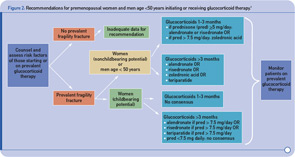
Women with childbearing potential and a history of fragility fracture who take 7.5 mg or more of prednisone per day can also be treated with alendronate, risedronate, or teriparatide. No recommendations are given for premenopausal women or men under age 50 with no history of fracture because the evidence is currently inadequate. “This is a population where a case-by-case determination needs to be made. Depending on their risk factors, bone mineral density measurements, and pregnancy plans, we may want to follow their bone mineral density more closely to see whether these studies are showing a decline if they are not on therapy,” Dr. Grossman says.
Other Preventive Strategies
All patients who begin treatment with a glucocorticoid at any dose and for any duration should be given calcium and vitamin D supplementation. Calcium intake of 1,200 to 1,500 mg per day is recommended, and vitamin D supplementation should achieve a therapeutic level of 25-hydroxyvitamin D greater than 30, or dosage of 800 to 1,000 IU per day.
“The steroids interfere with calcium absorption, so theoretically there may be reasons why patients treated with glucocorticoids should have more intake of vitamin D, but there are not a lot of data to support that,” Dr. Grossman says. “We will probably get a better idea about whether that makes a difference in fracture risk reduction as people report more data about vitamin D supplementation over the next five to 10 years.”
Many patients are unaware that they should be concerned about osteoporosis if they are taking a glucocorticoid. “Patients don’t often ask for bone density tests to be done. They wait until their doctor says they need to get one. They do, however, frequently report concerns about the negative aspects of bisphosphonates because of what is reported in the mainstream press,” Dr. Grossman says.
“I hope that patients will become more aware of the positive benefit of preventive therapy, and that they can play an important role in getting preventive care,” she continues. “If patients become aware of these recommendations and are more aware of the consequences in terms of bone health, that will improve their compliance with therapy.”
Kathy Holliman is a medical journalist based in New Jersey.

